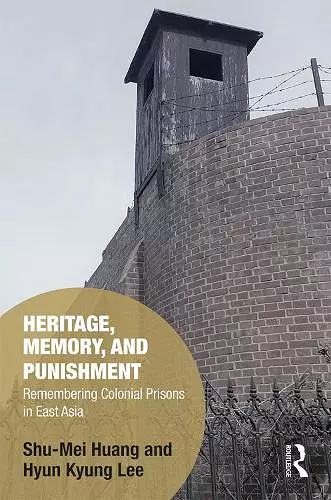Heritage, Memory, and Punishment
Remembering Colonial Prisons in East Asia
Shu-Mei Huang author Hyun-Kyung Lee author
Format:Hardback
Publisher:Taylor & Francis Ltd
Published:26th Sep '19
Currently unavailable, and unfortunately no date known when it will be back
This hardback is available in another edition too:
- Paperback£43.99(9780367776879)

Based on a transnational study of decommissioned, postcolonial prisons in Taiwan (Taipei and Chiayi), South Korea (Seoul), and China (Lushun), this book offers a critical reading of prisons as a particular colonial product, the current restoration of which as national heritage is closely related to the evolving conceptualization of punishment. Focusing on the colonial prisons built by the Japanese Empire in the first half of the twentieth century, it illuminates how punishment has been considered a subject of modernization, while the contemporary use of prisons as heritage tends to reduce the process of colonial modernity to oppression and atrocity – thus constituting a heritage of shame and death, which postcolonial societies blame upon the former colonizers. A study of how the remembering of punishment and imprisonment reflects the attempts of postcolonial cities to re-articulate an understanding of the present by correcting the past, Heritage, Memory, and Punishment examines how prisons were designed, built, partially demolished, preserved, and redeveloped across political regimes, demonstrating the ways in which the selective use of prisons as heritage, reframed through nationalism, leaves marks on urban contexts that remain long after the prisons themselves are decommissioned. As such, it will appeal to scholars of sociology, geography, the built environment, and heritage with interests in memory studies and dark tourism.
'Shu-Mei Huang and Hyun Kyung Lee provide a new, East Asian, and transnational take on prisons as places of pain and shame—a major contribution to the heritage literature. They analyze the building of prisons by colonial Japan in China, Korea and Taiwan and their rebirth as heritage sites designed to restore national honour and strengthen national cohesion. The authors show, nevertheless, that the sites remain caught up in shifting regional geopolitics, their multiple interpretations generating international tensions that can only be resolved at the diplomatic level.'- William Logan, Professor Emeritus, Deakin University, Australia
'Sites of Japan’s colonial incarceration relate to both the authority of geography and the power of heritage history. Huang and Lee both demonstrate in their ground-breaking volume how these often punitive forms of colonial modernity were then later consumed, reshaped or destroyed in the ensuing years of national and international debates about the legacies of empire.' - Barak Kushner, Professor of East Asian History, University of Cambridge, UK
‘Huang and Lee’s well-researched and thoughtful work reminds us of the dangerous temptation to confine critique to a reviled external ‘Other’ when the impulse to repression still thrives much closer to home.’ - Edward Vickers, International Journal of Taiwan Studies
‘Tackling the difficult legacies of colonialism and decolonisation, the authors offer a refreshing and compelling perspective that transcends the often myopic and simplistic debates surrounding Western colonialism. As such, this book has a broad appeal not only to scholars interested in East Asian history, but also to scholars in postcolonial studies, heritage studies, memory studies, and penology.’ - Rin Ushiyama, Journal of Cultural Analysis and Social Change
'Huang and Lee's excellent and highly innovative volume exemplifies how the interdisciplinary intellectual territory of critical heritage studies intersects with empirical history and politics.' - Anoma Pieris, International Journal of Heritage Studies
'Shu-Mei Huang and Hyun Kyung Lee provide a new, East Asian, and transnational take on prisons as places of pain and shame—a major contribution to the heritage literature. They analyze the building of prisons by colonial Japan in China, Korea and Taiwan and their rebirth as heritage sites designed to restore national honour and strengthen national cohesion. The authors show, nevertheless, that the sites remain caught up in shifting regional geopolitics, their multiple interpretations generating international tensions that can only be resolved at the diplomatic level.'- William Logan, Professor Emeritus, Deakin University, Australia
'Sites of Japan’s colonial incarceration relate to both the authority of geography and the power of heritage history. Huang and Lee both demonstrate in their ground-breaking volume how these often punitive forms of colonial modernity were then later consumed, reshaped or destroyed in the ensuing years of national and international debates about the legacies of empire.' - Barak Kushner, Professor of East Asian History, University of Cambridge, UK
‘Huang and Lee’s well-researched and thoughtful work reminds us of the dangerous temptation to confine critique to a reviled external ‘Other’ when the impulse to repression still thrives much closer to home.’ - Edward Vickers, International Journal of Taiwan Studies
‘Tackling the difficult legacies of colonialism and decolonisation, the authors offer a refreshing and compelling perspective that transcends the often myopic and simplistic debates surrounding Western colonialism. As such, this book has a broad appeal not only to scholars interested in East Asian history, but also to scholars in postcolonial studies, heritage studies, memory studies, and penology.’ - Rin Ushiyama, Journal of Cultural Analysis and Social Change
'Huang and Lee's excellent and highly innovative volume exemplifies how the interdisciplinary intellectual territory of critical heritage studies intersects with empirical history and politics.' - Anoma Pieris, International Journal of Heritage Studies
ISBN: 9781138628182
Dimensions: unknown
Weight: 453g
184 pages